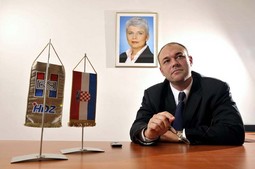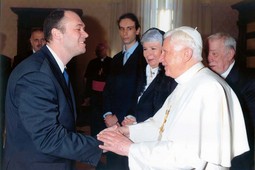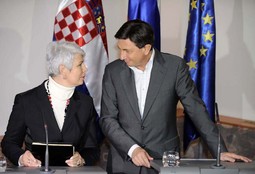Published in Nacional number 765, 2010-07-13
THE PRIME MINISTER'S EU NEGOTIATIONS ADVISOR
"I'm leading us to the EU through quiet diplomacy"
DAVOR STIER, PRIME MINISTER Jadranka Kosor's envoy for Euro-Atlantic cooperation, whose quiet diplomacy succeeded in unblocking the negotiations with the EU, discusses the mediation between the Croatian Prime Minister and Borut Pahor and Croatia's EU accession perspectives
 ADVISOR Davor Stier is numbered among the closest circle of Prime Minister Jadranka Kosor's confidential aids, whose job it is to pass on her messages to other European prime ministers"I am confident that it was thanks to a quiet diplomacy and meetings with various European prime ministers that we succeeded in unblocking the negotiations with the European Union. But please do not ask me to which prime ministers I passed on messages from Prime Minister Jadranka Kosor, as secrecy is the essence of quiet diplomacy," says Davor Stier, an advisor and one of the closest confidential aids to Jadranka Kosor.
ADVISOR Davor Stier is numbered among the closest circle of Prime Minister Jadranka Kosor's confidential aids, whose job it is to pass on her messages to other European prime ministers"I am confident that it was thanks to a quiet diplomacy and meetings with various European prime ministers that we succeeded in unblocking the negotiations with the European Union. But please do not ask me to which prime ministers I passed on messages from Prime Minister Jadranka Kosor, as secrecy is the essence of quiet diplomacy," says Davor Stier, an advisor and one of the closest confidential aids to Jadranka Kosor.
The interview he has given for Nacional last week was the first public appearance by this very discrete advisor, who has over the past year been the chief participant of the process of quiet diplomacy and the mediator between Jadranka Kosor and Borut Pahor. To date Davor Stier has been mentioned in two situations in which his name has been singled out. First Social Democratic Party (SDP) Members of Parliament tried to provoke Jadranka Kosor when they noted that her aid was receiving a wage of 24 thousand kuna, greater than her own wage. Then in the spring there was a report that, while he lived in Argentina, he regularly celebrated the anniversary of the proclamation of the World War II period Independent State of Croatia, which he acknowledged in a short statement, adding that he had in the meantime abandoned Ustasha ideas.
Davor Stier is the descendant of Croatian political emigrants who came to Argentina after World War II. Ivan Stier, his paternal grandfather, was a colonel with the Ustasha and an aid to Maks Luburic, while his mother's father, Milorad Lukac, was one of the top Croatian Peasant Party (HSS) emigrant politicians. Davor Stier was born in Buenos Aires in 1972, his father was a doctor, and his mother, Marija Lukac, was a university professor. He moved to Croatia in 1996, worked at the embassies in Washington and Brussels, and served until July of 2009 as the foreign policy advisor to Ivo Sanader. Indicative of just how close Stier is now to Jadranka Kosor is the fact that she recently co-opted him to the HDZ (Croatian Democratic Union) presidency.
NACIONAL: Is it fair to say that Prime Minister Kosor has put you in charge of the informal channels of communication with foreign politicians?
- I am the Prime Minister's envoy for Euro-Atlantic cooperation and it is my job in the frame of the Office of Chief Negotiator Vladimir Drobnjak to pass on key messages in the context of the completion of the negotiations with the European Union. I was involved in what is known as the quiet diplomacy.
NACIONAL: How successful was the quiet diplomacy?
- We were very successful in unblocking the negotiations with Slovenia. A year ago nobody would have dared to forecast when Croatia might conclude the accession negotiations. Then Prime Minister Kosor initiated a new phase of political dialogue and got the quiet diplomacy on the job, and the result was the unblocking of the negotiations. In the past twelve months we have succeeded in closing more chapters than in the preceding four and a half years, and it can now be said with certainty that Croatia shall be the 28th member of the European Union.
NACIONAL: Why then did the Ivo Sanader administration fail to use the services of the quiet diplomacy?
- Depending on the situation and the moment we used various forms of diplomatic activity. The key to the success of Prime Minister Kosor was in the fact that she was successful in creating a climate of trust with Borut Pahor. The fact is that the Prime Minister did an excellent job for Croatia.
NACIONAL: How did the quiet diplomacy in the negotiations with Slovenia look from the inside?
- If you want to succeed, in some cases you have to close the doors and avoid the attention of the press. This is, of course, not a secret diplomacy in the sense of some kind of secret deal or agreement. They were discussions led far from the public eye, which paved the way for the signing of public agreements. I met personally with my counterparts and with the people who enjoyed Slovenian Prime Minister Borut Pahor's confidence.
NACIONAL: And with Pahor himself?
- Yes, I met with him and with some other European prime ministers for whom Croatian Prime Minister Jadranka Kosor had messages she wished me to pass on as her representative.
NACIONAL: If the diplomacy is so successful, why has Croatian been almost six years in its negotiations with the EU?
- When Romania and Bulgaria were accepted into the EU, the enlargement process took on a new dynamics. There is a much greater role for the candidate country in winning support for progress in the negotiations. I think that Croatia has managed to achieve these dynamics and we can be certain that we will soon become the 28th EU member state.
NACIONAL: Are there countries within the EU that are obstructing Croatian accession?
- Just as she acceded to NATO, Croatia will likewise accede to the European Union. To do so she requires the support of all 27 members, but I feel that we have succeeded in creating a consensus among them. I do not wish to exaggerate our role, but we also need not exercise false humility. It was harder for us to achieve this consensus in Croatia's favour than it had been for the countries accepted into the European Union before us. There was still enthusiasm for enlargement at the time - not any more. That makes our success all the greater.
NACIONAL: Do you feel that the accession of new members to the EU will be put on the back burner after Croatian accession? A VISIT TO THE VATICAN In mid March Davor Stier travelled with Jadranka Kosor to visit Pope Benedict XVI- The other countries of South East Europe will inevitably have to pass through all of the phases we had to pass in the negotiation process. A certain period of time will, therefore, pass before their accession. It is Croatia's interest that during that period a message be sent that all the countries of South East Europe have an accession perspective. Figuratively speaking, in these twenty years of independence we have built a quite solid house, whose value will rise when we accede to the European Union. But the end value of this house depends on its neighbourhood and environment, and that is why it is in our interest that the neighbourhood be stable and progressive. And stability ensures a Euro-Atlantic perspective.
A VISIT TO THE VATICAN In mid March Davor Stier travelled with Jadranka Kosor to visit Pope Benedict XVI- The other countries of South East Europe will inevitably have to pass through all of the phases we had to pass in the negotiation process. A certain period of time will, therefore, pass before their accession. It is Croatia's interest that during that period a message be sent that all the countries of South East Europe have an accession perspective. Figuratively speaking, in these twenty years of independence we have built a quite solid house, whose value will rise when we accede to the European Union. But the end value of this house depends on its neighbourhood and environment, and that is why it is in our interest that the neighbourhood be stable and progressive. And stability ensures a Euro-Atlantic perspective.
NACIONAL: As far as I know, you were in Brussels at the meeting with Jose Manuel Barroso during the negotiations on the members of the arbitration council that will decide on the border between Croatia and Slovenia. What guarantees did you receive from Barroso?
- We knew that the EU would propose competent arbitrators, but State Secretary Bozinovic and I wished, on behalf of Prime Minister Kosor to acquaint Barroso with our agreement with Slovenia. According to the agreement Barroso is the one who will propose a list of experts from which Croatia and Slovenia will select the arbitrators, and if they fail to agree, the president of the International Court of Justice will do it. This gives Barroso, as the president of the European Commission, a role he has not had before and we have received guarantees from him that the arbitrators will be professional and impartial.
NACIONAL: Do you know that the SDP has warned that the arbitrators will probably be bureaucrats lacking the competence to conduct as important a task as demarcation is?
- I think that Zoran Milanovic also got the same message at a meeting with Barroso.
NACIONAL: Will there be difficulties in closing the negotiation chapter on the judiciary?
- Croatia is expected to continue its credible investigation into the "artillery logs." Croatia will do so and close Chapter 23. In technical terms we will be prepared to conclude the negotiations by the end of the year, and then the member countries will make the decision on the conclusion of the negotiations and the signing of an accession agreement with Croatia.
NACIONAL: What was under discussion during the recent visit to Moscow?
- This was the third meeting between Prime Minister Jadranka Kosor and Vladimir Putin. We discussed strengthening economic relations and concrete energy projects. Prime Minister Kosor presented the Croatian interest in seeing South East Europe completely transformed from a former zone of operations, to a new zone of cooperation. I think that South East Europe offers an opportunity for cooperation between the West and Russia, as it is sufficiently interesting to all of the key factors in the Euro-Atlantic zone and, at the same time, there are no set pieces that would prevent dialogue and cooperation between the West and Russia. As a member of NATO, and soon of the EU, Croatia can play an important role here.
NACIONAL: When speaking of DruzbAdria, why does Jadranka Kosor now advocate the project, when she strongly opposed it five years ago?
- There were certain environmental implications at the time. Thanks to the development of technology these difficulties have been eliminated and we can now be open to the project. Government supports the DruzbAdria project, and now Janaf and Russia's Transneft have to hammer out a deal. What is most important at this point in time is that quality negotiations are being led.
NACIONAL: People in the know concerning government affairs say of you that you are constantly travelling. How often do you travel abroad?
- Much more often than my wife and children would like. But it is my job and I am happy because my work contributes to important national goals. There are periods of four to five days at a time when I am in a different city every day, then a few days at home, and then on the road again. After the last intergovernmental conference at which we opened the last chapters, however, there has been a somewhat slower pace and I have travelled less these past weeks.
NACIONAL: How did you feel when the question was raised in Parliament as to how it was possible that your wage was greater than that received by Prime Minister Kosor?
- I did not have any problem with that. I am employed in the office of the chief negotiator and my wages are regulated by the ordinance on wages in the foreign affairs service.
NACIONAL: What schools have you completed?
- I graduated political science and international relations at the Catholic University of Buenos Aires, which I later gained nostrification for at the University of Zagreb. I have also graduated journalism.
NACIONAL: Is it true that former Prime Minister Sanader offered you a job in his consultancy agency?
- I was an advisor to Prime Minister Sanader and it is true that he offered that I take part in setting up his company. I turned the offer down because I was already involved in the negotiations with Slovenia. I am grateful to Prime Minister Kosor because, when she took up the post of Prime Minister, she offered me a major assignment in the frame of the quiet diplomacy with Slovenia and I believe we did a good job of it.
NACIONAL: You were born and grew up in a prosperous family in Argentina. What motivated you to come and live in Croatia?
- At home we always spoke Croatian, and I used Spanish at school and outside of the family. We were integrated into Argentinean society, but we were never assimilated and we preserved our language and customs. In school and at university they called me "El Croata," but there was no independent Croatia on the map before 1991. For me it was a great joy when the first democratic elections were held in 1990 and when Croatia was recognised as a sovereign state in 1992. I came here the first time in 1990 in the frame of a programme run by the Croatian Heritage Foundation. I was in Croatia again three weeks before the fall of Vukovar as a journalist with the Argentinean newspaper El Cronista and Radio America, and returned to Argentina in February of 1992. I graduated international relations and political science and definitely moved to Croatia in 1996 at the invitation of the Ministry of Foreign Affairs.
NACIONAL: I was recently reported that as a youth you celebrated the 10th of April, when the World War II quisling Independent State of Croatia was proclaimed. Are you still a right-winger and an anti-communist? KOSOR AND PAHOR Davor Stier accompanied Prime Minister Kosor during her negotiations with Slovenian Prime Minister Borut Pahor- There are some 150 thousand Croatians living in Argentina, the majority of which are economic migrants who moved there between the two World Wars. My family came after World War II, and when speaking of myself I can quote Ortega y Gasset, who says, "I am myself and my circumstances." In the circumstances of the Cold War I was strongly anti-communist, an opponent of Yugoslavia and an advocate of establishing an independent Croatia. I went to April 10th celebrations, but later realised that I had erred, and that Franjo Tudjman had been right when he said that a progressive Croatia could only be built on the foundation of anti-fascism. In my opinion anti-fascism, and anti-communism, are the democratic values on which Croatia can be based.
KOSOR AND PAHOR Davor Stier accompanied Prime Minister Kosor during her negotiations with Slovenian Prime Minister Borut Pahor- There are some 150 thousand Croatians living in Argentina, the majority of which are economic migrants who moved there between the two World Wars. My family came after World War II, and when speaking of myself I can quote Ortega y Gasset, who says, "I am myself and my circumstances." In the circumstances of the Cold War I was strongly anti-communist, an opponent of Yugoslavia and an advocate of establishing an independent Croatia. I went to April 10th celebrations, but later realised that I had erred, and that Franjo Tudjman had been right when he said that a progressive Croatia could only be built on the foundation of anti-fascism. In my opinion anti-fascism, and anti-communism, are the democratic values on which Croatia can be based.
NACIONAL: How would you describe your present political outlook?
- I am a Christian democrat. For me, that means that I accept the universal values that emerge from our Christian tradition and faith, and try to translate these values into concrete policies. I do not wish to impose these values on anyone, but they are my starting point in building a consensus in a democratic and pluralist Croatia. It is important that in Croatia we know who we are and that we have a clear identity linked to Christian roots.
Related articles
Barisic could bankrupt HDZ
Chief State Attorney Mladen Bajic could strike a massive blow against the ruling HDZ party with a single signature, and put the party into… Više
Latest news
-
28.10.2010. / 14:15
'A profitable INA is in everyone's interest'
-
28.10.2010. / 09:38
Sanader’s eight fear SDP — Won’t bring down Government
-
21.10.2010. / 15:02
Interior Ministry turned a blind eye on Pukanic assassination
-
20.10.2010. / 09:34
Barisic could bankrupt HDZ




